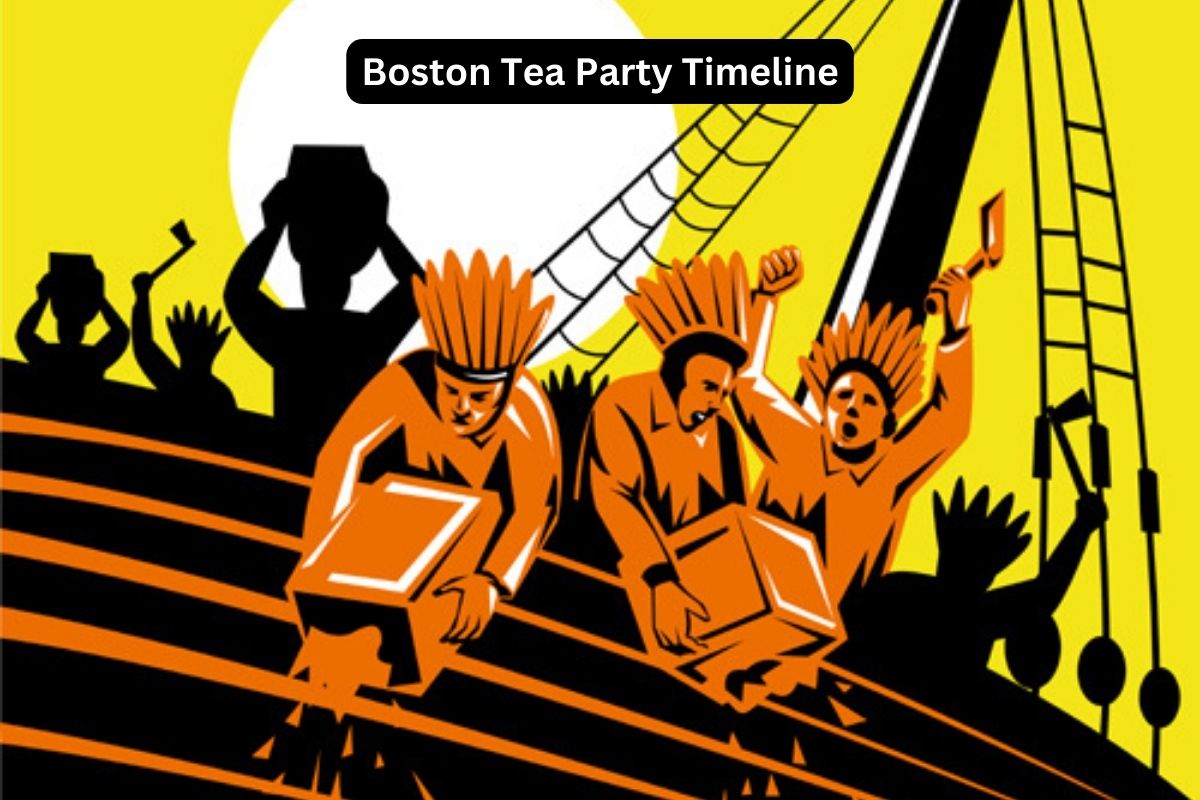The Boston Tea Party, a pivotal event in American history, occurred on December 16, 1773, as a dramatic protest against British taxation and perceived injustices.
Preceded by years of colonial resentment over measures like the Sugar Act, Stamp Act, and Townshend Acts, which imposed taxes and restrictions, tensions were already high.
The Boston Massacre of 1770 and the Gaspee Affair in 1772 further fueled colonial anger.
However, the breaking point was the Tea Act of 1773, which granted a tea monopoly to the British East India Company and lowered tea taxes. Colonists saw this as another attempt to exert control and impose unfair taxation.
Disguised as Mohawk Indians, a group of colonists boarded three British ships in Boston Harbor and dumped 342 chests of tea into the harbor. This iconic act, known as the Boston Tea Party, symbolized resistance against British oppression.
This act of defiance involved the boarding of British ships and the dumping of tea into Boston Harbor, ultimately escalating tensions between the American colonies and Britain and playing a significant role in the lead-up to the American Revolutionary War.
| Year | Event |
|---|---|
| 1764 | Sugar Act |
| 1765 | Stamp Act |
| 1767 | Townshend Acts |
| 1770 | Boston Massacre |
| 1772 | Gaspee Affair |
| 1773 | Tea Act |
| December 16, 1773 | Boston Tea Party |
| 1774 | Coercive Acts (Intolerable Acts) |
| September 1774 | First Continental Congress |
| April 1775 | Battles of Lexington and Concord (Start of the Revolutionary War) |
Timeline of the Boston Tea Party
1764 – Sugar Act
In 1764, the British Parliament passed the Sugar Act, a taxation measure aimed at raising revenue from the American colonies. This act imposed taxes on a range of imported goods, including sugar, molasses, and coffee.
Also Read: History of Taxes in the US
However, what made the Sugar Act particularly contentious was not just the taxes themselves but also the stringent enforcement provisions. British customs officers were granted greater authority to collect these taxes, often resorting to invasive searches and seizures.
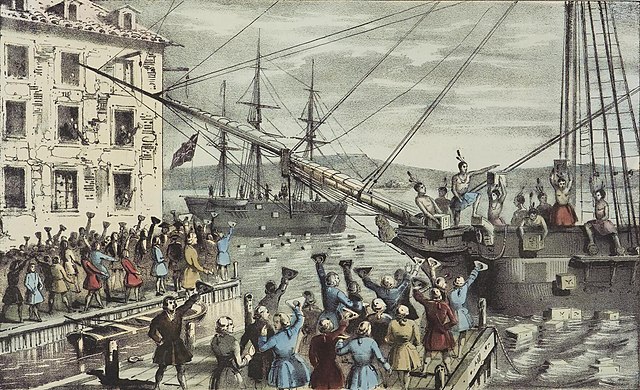
For the American colonists, this act symbolized a significant overreach of British authority and a violation of their rights, particularly the cherished principle of “no taxation without representation.”
The seeds of resistance were sown, and the stage was set for future protests against British taxation policies.
1765 – Stamp Act
In 1765, the Stamp Act was enacted by the British Parliament. This legislation mandated that all legal documents, newspapers, and various other printed materials in the American colonies had to be produced on specially stamped paper, which was subject to taxation.
The Stamp Act marked a direct tax on everyday colonial life, leading to widespread outrage and protest. Colonists organized the Stamp Act Congress, a unified effort to voice their grievances and call for a boycott of British goods.
The slogan “No taxation without representation” echoed throughout the colonies, emphasizing the deep-seated belief that colonists should not be taxed by a government in which they had no representation.
The Stamp Act and the resistance it generated played a pivotal role in galvanizing colonial opposition to British rule.
1767 – Townshend Acts
In 1767, the British Parliament passed the Townshend Acts, a series of taxes imposed on imported goods, including glass, paper, paint, lead, and tea. These acts were designed to generate revenue to cover the salaries of colonial officials, further consolidating British control over the American colonies.
The Townshend Acts intensified the colonial response to British taxation. Colonists responded with boycotts, protests, and non-importation agreements, collectively expressing their refusal to accept these taxes without a fight.
The acts of resistance against the Townshend Acts heightened tensions between the American colonies and Britain, setting the stage for further confrontations and eventually the American Revolution.
1770 – Boston Massacre
In 1770, tensions between American colonists and British troops stationed in Boston reached a boiling point.
On March 5, a confrontation escalated into violence, resulting in the deaths of several colonists. This event became known as the Boston Massacre.
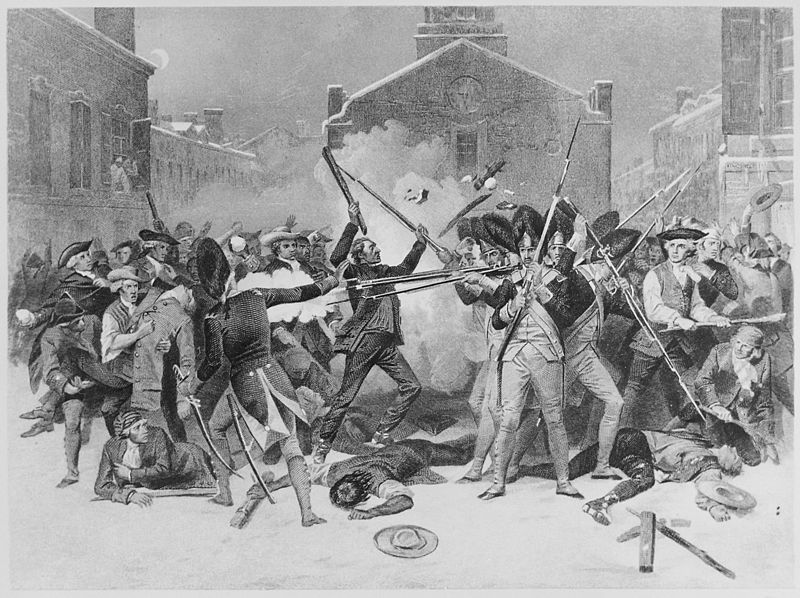
The Boston Massacre was a turning point in colonial-British relations. Colonists saw it as evidence of British oppression and brutality. The incident was widely publicized, and it inflamed anti-British sentiments throughout the colonies.
It also led to increased colonial unity against British rule, as it was seen as an example of the heavy-handedness of British troops in the colonies.
1772 – Gaspee Affair
The Gaspee Affair was another incident that heightened tensions between the American colonists and British authorities. In June 1772, the British customs schooner Gaspee ran aground in Narragansett Bay, Rhode Island.
Local colonists, frustrated with the enforcement of British trade regulations, saw an opportunity.
In a bold act of defiance, a group of colonists, including some with connections to the Sons of Liberty, boarded the stranded Gaspee, captured the crew, and then set the ship on fire.
This act was a significant challenge to British authority and a demonstration of the colonists’ growing willingness to take direct action against British enforcement measures.
1773 – Tea Act
The Tea Act of 1773 was a British attempt to resolve some of the tensions with the American colonies by reducing the tax on tea and granting the British East India Company a monopoly on tea sales in the colonies. However, the colonists were not appeased.
They viewed the Tea Act with suspicion, seeing it as another attempt to assert British control and infringe upon their rights. The Act maintained the principle of taxation without representation, which was a key point of contention.
It also threatened the livelihood of colonial merchants who had been smuggling tea, as it aimed to make legally imported British tea cheaper than smuggled tea.
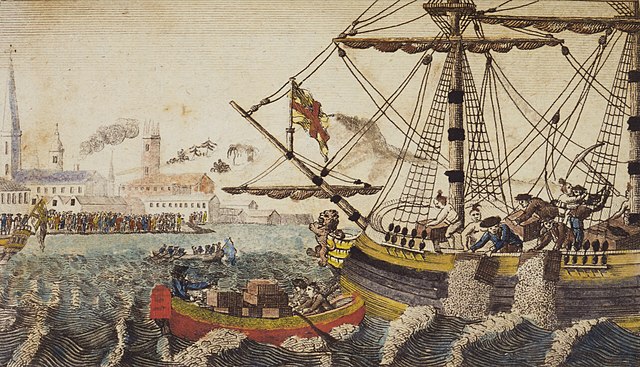
December 16, 1773 – Boston Tea Party
The Boston Tea Party, one of the most iconic acts of resistance in American history, took place on the night of December 16, 1773.
It was a response to the Tea Act of 1773, which granted the British East India Company a monopoly on tea sales in the American colonies and lowered the tax on tea. Colonists, who had long resisted British taxation without representation, saw this as yet another affront to their rights.
In an act of protest, a group of colonists, disguised as Mohawk Indians, boarded three British ships anchored in Boston Harbor—the Dartmouth, the Eleanor, and the Beaver.
They proceeded to empty 342 chests of British tea into the harbor. The Boston Tea Party symbolized the colonists’ determination to resist British oppression and served as a rallying cry for those seeking change.
1774 – Coercive Acts (Intolerable Acts)
In response to the Boston Tea Party, the British Parliament passed a series of punitive measures known as the Coercive Acts in 1774. These acts were also referred to as the Intolerable Acts by the colonists due to their oppressive nature.
The Coercive Acts closed the port of Boston, severely limiting its economic activity. They also placed Massachusetts under direct British control by granting more authority to the royal governor and limiting town meetings.
Additionally, the Quartering Act was expanded, requiring colonists to provide housing for British soldiers.
These acts were aimed at punishing Massachusetts for its role in the Tea Party and restoring British control, but they had the opposite effect. Instead of quelling colonial resistance, they galvanized support for Massachusetts and led to widespread sympathy for its cause throughout the other American colonies.
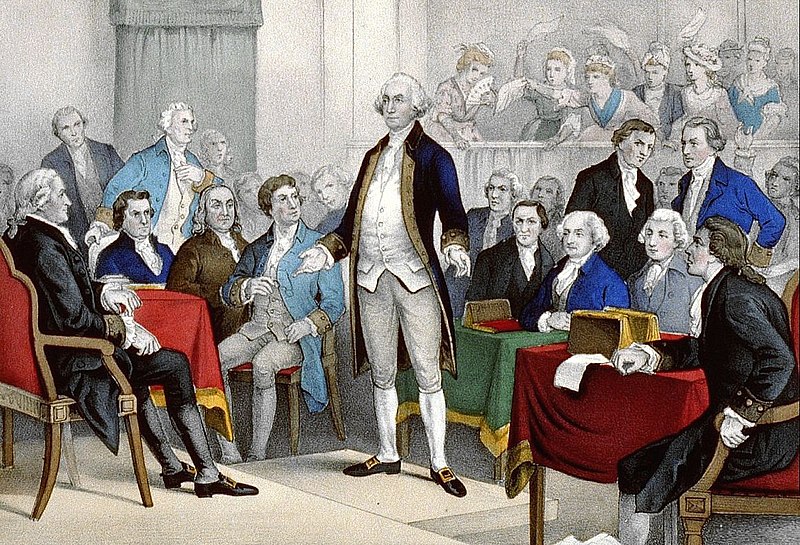
September 1774 – First Continental Congress
The Coercive Acts prompted swift action among the American colonies. In September 1774, representatives from twelve colonies convened in Philadelphia for the First Continental Congress.
The Congress was a response to the repressive measures of the British government and aimed to address grievances and formulate a unified colonial response.
During the First Continental Congress, delegates issued a Declaration of Rights and Grievances, asserting the rights of colonists and their opposition to the Coercive Acts. They also called for a boycott of British goods and established mechanisms for colonial self-defense, including the creation of militias.
April 1775 – Battles of Lexington and Concord (Start of the Revolutionary War)
Tensions between the American colonies and Britain continued to escalate, and armed conflict finally erupted on April 19, 1775, with the Battles of Lexington and Concord. These battles, which occurred in Massachusetts, marked the official beginning of the American Revolutionary War.
British troops were dispatched to seize colonial military supplies in Concord. However, colonial militias, alerted by riders like Paul Revere, were prepared to resist.
The first shots of the war were fired in Lexington, and the conflict quickly spread to Concord. The British were forced to retreat back to Boston, where they were besieged by colonial forces.
The Battles of Lexington and Concord were pivotal moments in American history, as they demonstrated that armed conflict was inevitable and that the colonists were willing to fight for their independence. These events set the stage for the long and arduous struggle of the American Revolution.
